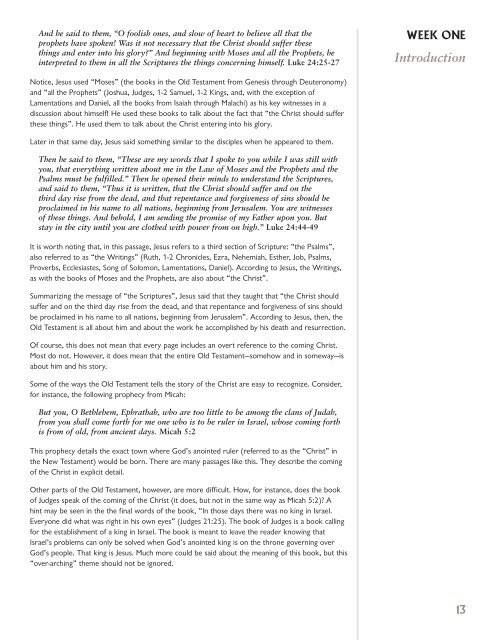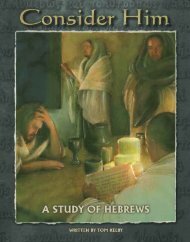You also want an ePaper? Increase the reach of your titles
YUMPU automatically turns print PDFs into web optimized ePapers that Google loves.
And he said <strong>to</strong> <strong>the</strong>m, “O foolish ones, and slow of heart <strong>to</strong> believe all that <strong>the</strong><br />
prophets have spoken! Was it not necessary that <strong>the</strong> Christ should suffer <strong>the</strong>se<br />
things and enter in<strong>to</strong> his glory?” And beginning with Moses and all <strong>the</strong> Prophets, he<br />
interpreted <strong>to</strong> <strong>the</strong>m in all <strong>the</strong> Scriptures <strong>the</strong> things concerning himself. Luke 24:25-27<br />
Notice, Jesus used “Moses” (<strong>the</strong> books in <strong>the</strong> Old Testament from Genesis through Deuteronomy)<br />
and “all <strong>the</strong> Prophets” (Joshua, Judges, 1-2 Samuel, 1-2 Kings, and, with <strong>the</strong> exception of<br />
Lamentations and Daniel, all <strong>the</strong> books from Isaiah through Malachi) as his key witnesses in a<br />
discussion about himself! He used <strong>the</strong>se books <strong>to</strong> talk about <strong>the</strong> fact that “<strong>the</strong> Christ should suffer<br />
<strong>the</strong>se things”. He used <strong>the</strong>m <strong>to</strong> talk about <strong>the</strong> Christ entering in<strong>to</strong> his glory.<br />
Later in that same day, Jesus said something similar <strong>to</strong> <strong>the</strong> disciples when he appeared <strong>to</strong> <strong>the</strong>m.<br />
Then he said <strong>to</strong> <strong>the</strong>m, “These are my words that I spoke <strong>to</strong> you while I was still with<br />
you, that everything written about me in <strong>the</strong> Law of Moses and <strong>the</strong> Prophets and <strong>the</strong><br />
Psalms must be fulfilled.” Then he opened <strong>the</strong>ir minds <strong>to</strong> understand <strong>the</strong> Scriptures,<br />
and said <strong>to</strong> <strong>the</strong>m, “Thus it is written, that <strong>the</strong> Christ should suffer and on <strong>the</strong><br />
third day rise from <strong>the</strong> dead, and that repentance and forgiveness of sins should be<br />
proclaimed in his name <strong>to</strong> all nations, beginning from Jerusalem. You are witnesses<br />
of <strong>the</strong>se things. And behold, I am sending <strong>the</strong> promise of my Fa<strong>the</strong>r upon you. But<br />
stay in <strong>the</strong> city until you are clo<strong>the</strong>d with power from on high.” Luke 24:44-49<br />
It is worth noting that, in this passage, Jesus refers <strong>to</strong> a third section of Scripture: “<strong>the</strong> Psalms”,<br />
also referred <strong>to</strong> as “<strong>the</strong> Writings” (Ruth, 1-2 Chronicles, Ezra, Nehemiah, Es<strong>the</strong>r, Job, Psalms,<br />
Proverbs, Ecclesiastes, Song of Solomon, Lamentations, Daniel). According <strong>to</strong> Jesus, <strong>the</strong> Writings,<br />
as with <strong>the</strong> books of Moses and <strong>the</strong> Prophets, are also about “<strong>the</strong> Christ”.<br />
Summarizing <strong>the</strong> message of “<strong>the</strong> Scriptures”, Jesus said that <strong>the</strong>y taught that “<strong>the</strong> Christ should<br />
suffer and on <strong>the</strong> third day rise from <strong>the</strong> dead, and that repentance and forgiveness of sins should<br />
be proclaimed in his name <strong>to</strong> all nations, beginning from Jerusalem”. According <strong>to</strong> Jesus, <strong>the</strong>n, <strong>the</strong><br />
Old Testament is all about him and about <strong>the</strong> work he accomplished by his death and resurrection.<br />
Of course, this does not mean that every page includes an overt reference <strong>to</strong> <strong>the</strong> coming Christ.<br />
Most do not. However, it does mean that <strong>the</strong> entire Old Testament—somehow and in someway—is<br />
about him and his s<strong>to</strong>ry.<br />
Some of <strong>the</strong> ways <strong>the</strong> Old Testament tells <strong>the</strong> s<strong>to</strong>ry of <strong>the</strong> Christ are easy <strong>to</strong> recognize. Consider,<br />
for instance, <strong>the</strong> following prophecy from Micah:<br />
But you, O Bethlehem, Ephrathah, who are <strong>to</strong>o little <strong>to</strong> be among <strong>the</strong> clans of Judah,<br />
from you shall come forth for me one who is <strong>to</strong> be ruler in Israel, whose coming forth<br />
is from of old, from ancient days. Micah 5:2<br />
<strong>This</strong> prophecy details <strong>the</strong> exact <strong>to</strong>wn where God’s anointed ruler (referred <strong>to</strong> as <strong>the</strong> “Christ” in<br />
<strong>the</strong> New Testament) would be born. There are many passages like this. They describe <strong>the</strong> coming<br />
of <strong>the</strong> Christ in explicit detail.<br />
O<strong>the</strong>r parts of <strong>the</strong> Old Testament, however, are more difficult. How, for instance, does <strong>the</strong> book<br />
of Judges speak of <strong>the</strong> coming of <strong>the</strong> Christ (it does, but not in <strong>the</strong> same way as Micah 5:2)? A<br />
hint may be seen in <strong>the</strong> <strong>the</strong> final words of <strong>the</strong> book, “In those days <strong>the</strong>re was no king in Israel.<br />
Everyone did what was right in his own eyes” (Judges 21:25). The book of Judges is a book calling<br />
for <strong>the</strong> establishment of a king in Israel. The book is meant <strong>to</strong> leave <strong>the</strong> reader knowing that<br />
Israel’s problems can only be solved when God’s anointed king is on <strong>the</strong> throne governing over<br />
God’s people. That king is Jesus. Much more could be said about <strong>the</strong> meaning of this book, but this<br />
“over-arching” <strong>the</strong>me should not be ignored.<br />
WeeK one<br />
Introduction<br />
13



